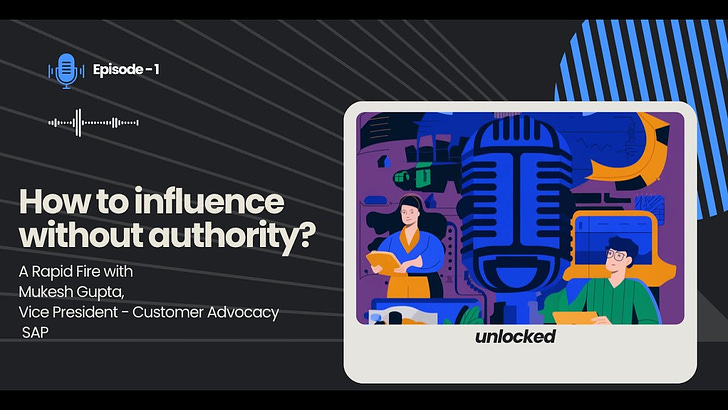Unlocked: How to influence without Authority?
'unlocked' with Mukesh Gupta, Vice President SAP, Customer Advocacy
This is our inaugural post in the series “unlocked“, where lifelong learners share practical tips to help us shine in our pursuit professional and personal excellence.
We are elated to have interviewed Mukesh Gupta, Vice President Customer advocacy at SAP. He also supports SAP user groups in South and SouthEast Asia. In addition to his work with SAP, he is an author, podcaster and a thought leader. He has authored three books – “Your Startup Mentor”, “Thrive” and “Being Happy”. He writes a popular blog – “Leaders worth Following” and is the host of the popular podcast – “Pushing Beyond the Obvious”.
In this conversation with Mukesh, he shares practical tips on how he ‘influences without authority’ and how he continues to learn every single day?
What specific techniques do you use to influence team members and stakeholders without having formal authority?
This is pretty much what I have done over the last 13 years. I am an individual contributor, and have to use a fair share of influencing without authority at work.
I usually use acronyms to remember things better and the one for influencing is LIE
L - Listening with a genuine intent is the first technique. Main point is to do this without a personal agenda. Be there for them when they need it.
I - stands for Influence, as in give influence to get influence. If someone reaches out for help, go the extra mile to help others when they ask for it. If you have helped them in your way, or have tried to, they are always there when you go to them. It is a way to influence, but not with an intent expecting return, but with the sole purpose of helping,
E - Expertise, most important thing is to develop expertise. With expertise and authority you build influence. If you are considered the best at what you do, be it on any topic, holding facilitated conversations, making presentations in front of 5000 people, or at coaching someone. This gives you a certain amount of influence.
When you do all 3 three of L-I-E in a combination it becomes a flywheel, and you get better at influence. To reiterate all empathetic listening, supporting has to be done without expecting returns and with genuineness.
My role requires me to get a lot of people together in terms of events, workshops etc. These people are from different teams and have to often go beyond their work responsibilities to make this happen. Unless I am able to influence them, I would not be able to make my work happen.
Can you share an example of a time when you successfully influenced a decision impacting your work? What did you learn from that experience?
I am planning a conference for customers in Mumbai next month. One of the speakers I was keen on getting onboard for a presentation, was not available. He had already signed up for another event at the same time. On hearing this, I got back to him on a phone call (rather than an email) and requested his presence in the Mumbai conference, as it would mean a lot to me - as it is important for customers to know what is happening in that space. In a matter of 24 hours he got back confirming that he would join, and that he had found an alternate who can replace him at the other conference. This was possible because of the rapport we have had and the ‘give influence’ that we spoke before. In terms of me supporting customer meeting requests, while going beyond my work responsibilities.
Even in conferences run by customers, I have been able to get a yes to my suggestions. This is due to an intentionally cultivated trust gained by listening to them, their challenges and trying my best to support them. In addition to this, once you have helped someone, they become beacons of your expertise and help spread your influence further. And interesting to note is that I have not always been able to help, so rather than the action of help it is about the intent to help that matters.
How do you adapt your influencing style when working with diverse cultural groups, including younger generations like Gen Z?
Different cultures have a different way of communication. Customers in Singapore, Germany prefer being direct with the communication. In cultures like in Singapore you are viewed as a vendor, and not necessarily the most important person to talk to. Whereas in India they treat you like a peer, and sometimes even on a pedestal given the MNC you belong to. Countries like Thailand, Indonesia expect some level of warming up before you talk business. With time this becomes important
When I work with folks who are senior by age, they expect a certain level of respect for their age, their experience. Whereas the younger generation respects authority, expertise, influence. No rambling , no expecting respect if you have not earned it. They have different styles of working, some passionate, some a bit relaxed, others passionate about a social cause like sustainability. They need exposure to newer opportunities. They look to succeed spectacularly or fail spectacularly. You got to give them those breaks.
The nuances (of culture, age-groups) come with experience. Knowing what they want, their needs is crucial here.
How do you build and maintain relationships that enable you to influence effectively, particularly in a remote or hybrid work environment?
“Rather than challenges, I would say this working style is different. My personal style is to meet face to face, wherever possible. One of things that we did very well in our team is our informal coffee corner sessions, twice a week. I am part of a global team with folks from Japan, Singapore, China, Lat am, US , Europe. So there are 2 sessions suitable for the Asia folks, and another for the American folks. These are purely no-agenda meetings. It is a simulation of bumping into each other and talking about what you are thinking, what's happening and so on.
The one we did this week, started with a comment on mandatory training around discrimination and bias, and a joke about how theory is so different from practice. While listening to the course, and answering you know what is allowed and what is not. But when you are out there, and seeing what is happening, what is socially acceptable in a given culture but not acceptable in another. What do you do in such cases? You pretty much follow the folks around you. This led to politics, health, dog’s health, haircut, beards and so on. This time to connect and spend time in the friendly batter is necessary.
If all are in office, this happens incidentally, you will bump into each other. If not, you need to find time and make this happen. Calendars are never free in these cases, you may not really find a slot just for a catch-up. I was fortunate enough to learn a lot from the community of “Thought leaders business school” during Covid. I learnt a lot about how to build a culture, create rapport, stay connected and why is this so important to be done virtually.
Few things I do, whenever I host a meeting, as people join in they will always hear a light instrumental like a flute, sitar or tabla. Everyone needs to come and be in the same context and I have realized that music has the ability to do this. This grounds you and brings you to the present moment.
Every meeting I attend I keep my camera on. This forces me to pay attention, it shows others that I care about the meeting, about them and that I am fully present in the call. Small things like this help in building rapport and trust and influence in the long term. Little things but go well when done together.”
What role does continuous learning play in your ability to influence someone especially in a rapidly changing digital landscape? What are some of your tips to stay updated on this topic?
“I run communities and host events for various CIO communities like ones for utilities, retail, automotive, and verticals like finance, procurement, oil and gas, CX, Security, Manufacturing, Supply Chain. I need to have conversations with each of them in their domain language. To be able to do this, I need to be constantly learning.
I block my calendar from 9:30 to 10:30 everyday. No meetings are accepted in this slot unless very critical. I curate a series of topics on Feedly. This leads to about 120 to 140 blogs every day. I skim through and mark 5-6 that I have to delve deeper and use this hour to do the deep dives.
The commute time to and from the office is what I use to go through youTube content for learning, from the subscribed videos. I add ones that I have to go further on to the watch later list.
Every time I have at least 20 mins of free time, or a meeting gets canceled, I use it to go back and finish watching the videos or complete unfinished reading. I make a quarterly goal and use mediums like Coursera, LinkedIn learning or edX to learn something new or refresh my understanding.
Reading is another way of learning, I read both fiction and non-fiction . I am currently reading The Valmiki Ramayana translated by Bibek Debroy.
What I do differently is being intentional about whatever I am reading or learning. The conference is on top of mind for me right now. Everything that I read I try to connect back to it. Can this be applied, how can it be applied? There could be some that do not have a direct application immediately. The intent and effort to think about how relevant this is or can I apply it, sticks with me. If you think about it, it is a simulation of having done it in physiological terms. This is also a form of repetition of what I have learnt, that helps retain that part if not the whole book or video.”
As a closing note, Mukesh adds,
“Be willing to serve and it will come back to you, remember to give first like the Book : Jab Jab Jab right hook says, you have to give at least 3 times before you can ask anything in return.”
We also got a chance to do a quick rapid-fire with Mukesh on the topic:
Thank you Mukesh for the valuable tips. Our readers are sure to put this to practice right away! Do let us know which of these resonate the most with you?




Thanks for checking in with me on this topic..
For those looking to learn more on the topic, we have a learning path just for you: https://wtdidyoulearntoday.substack.com/p/trying-to-get-better-at-influencing?r=4eyjkk